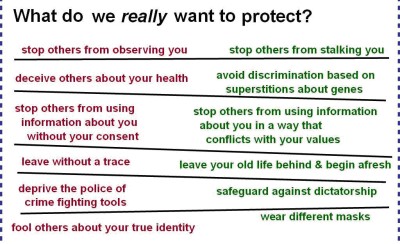Concepts of Privacy in a Posthuman Age
Sebastian Sethe, Ph.D.
Page 3 of 3
If we look at privacy simply from how it is being used by the courts and in law, we can identify a number of cases where very different types of privacy conceptualizations operate concurrently or even in juxtaposition. Scholars such as Daniel Solove [1] clearly identify taxonomy of privacy in need of closer scrutiny.
Here I come back to the previous discussions about information. I would argue that the reliance on an informational aspect is essential for privacy to remain a meaningful legal concept. To endorse privacy as empowerment, the analysis connects 'liberty' (e.g. "what legitimate exercise of personal autonomy") and 'pursuit of happiness' (e.g. "what grievance is experienced") through the lens of information. The question will then be whether limitations of informational flow are adequate and effective measures to connect the two constitutional pillars.
For example, if we take out the concept of solitude and attempt this kind of analysis we would probably discover that we are not called to protect "solitude" but the fact that many people need the freedom to be alone at certain times for their psychological well being.
There is no scope here to develop this critical sub assumption in detail. The following slide gives some pointers about what how a shift in analysis and focus follows where the concept of privacy protection is disassembled into its constitutive parts, in order to reinterpret privacy as empowerment.

This brings us back to the mid-way sociological question whether privacy has become dispositional. Maybe it is. Maybe it is for those beings that have enough social stability, enough wealth, enough self-confidence, job security, etc, to ward off any negative effect of not having their privacy protected. For those who do not yet have that luxury, the protection of privacy will remain of importance.
I have highlighted that future conceptions of privacy will be shaped by three developments: technological options, modes of embodiment and social attitudes will remain the most important constituents of privacy in the posthuman age.
But I have also explained why these developments cannot mean that we will not need legal protections of privacy. Where the law is called to resolve conflict, the protection of privacy will remain vital. Privacy laws will only remain focused and flexible enough to encompass the challenges of a posthuman future if we begin to operate a concept of privacy as privacy as empowerment. This approach calls for an evolutionary alertness in the law that accompanies and at times challenges those other evolutions in technology, embodiment and perception.
Acknowledgements: I would like to thank the Terasem Foundation for the invitation to present these thoughts and Dr. Mark Taylor, David Townend and in particular Jessica Wright for many stimulating discussions that were instrumental in seeding these observations.
Footnote
Bio
 Sebastian Sethe, among other commitments, is a legal and regulatory officer at the NorthEast England Stem Cell Institute (NESCI) at Durham and Newcastle Universities in the UK. He holds a PhD in Innovation Management and a Master in Biotechnological Law and Ethics from the University of Sheffield, UK. His undergraduate legal studies were conducted at Humboldt University in Berlin, Germany. His research interests include a wide spectrum of topics in the law, management and philosophy of innovation, with a particular focus in life extension technologies.
Sebastian Sethe, among other commitments, is a legal and regulatory officer at the NorthEast England Stem Cell Institute (NESCI) at Durham and Newcastle Universities in the UK. He holds a PhD in Innovation Management and a Master in Biotechnological Law and Ethics from the University of Sheffield, UK. His undergraduate legal studies were conducted at Humboldt University in Berlin, Germany. His research interests include a wide spectrum of topics in the law, management and philosophy of innovation, with a particular focus in life extension technologies.